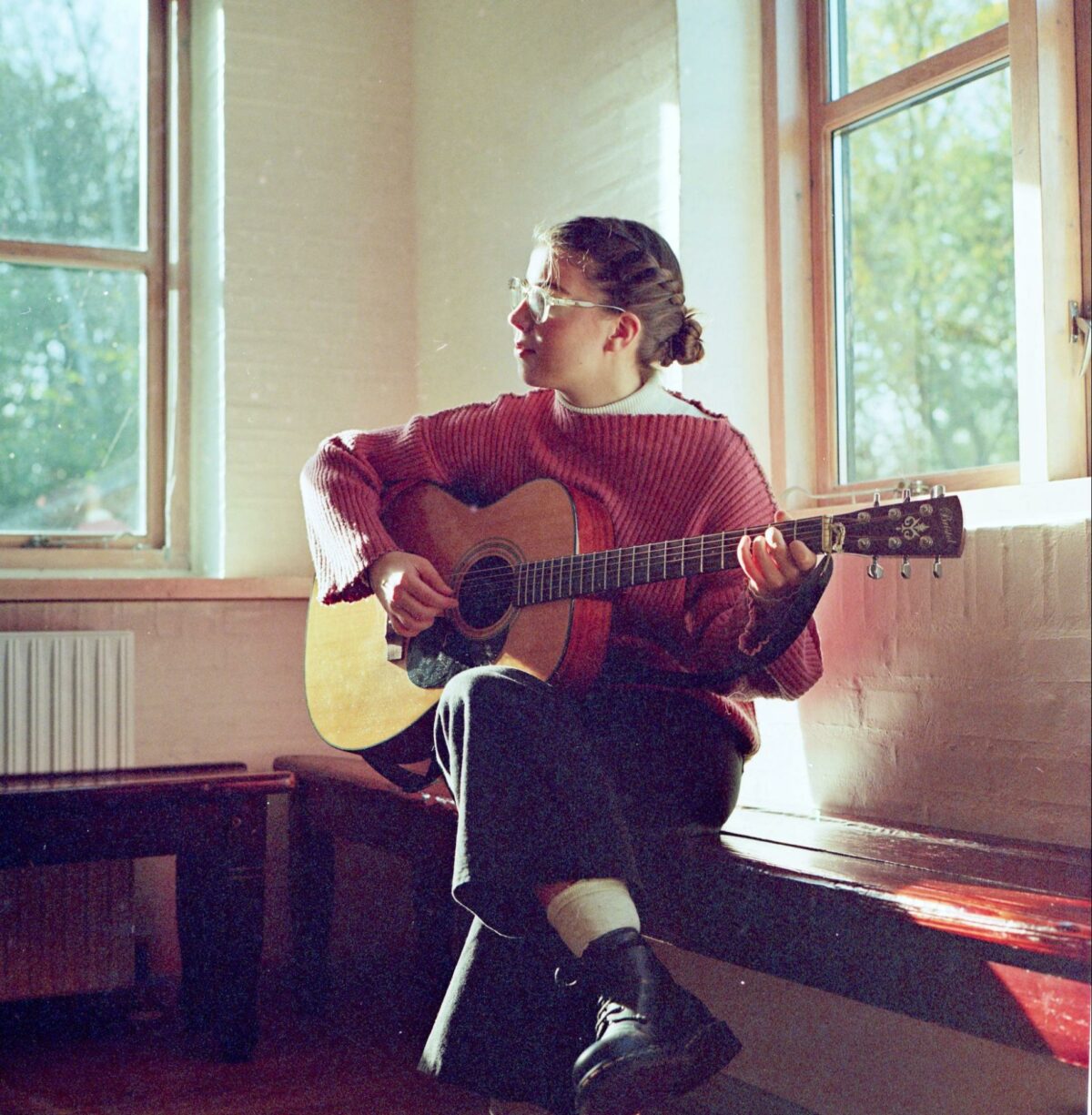ARNY MARGRET
I Miss You, I Do out 3/7/25 (One Little Independent Records)
Arny Margret never expected anyone to hear her songs. A homebody who had long worked in her family’s bakery in a small fishing town in the Westfjords of Iceland serendipitously found herself in the little Reykjavik studio of producer Guðm. Kristinn Jónsson—Kiddi, as she’d soon begin to call him—back in 2021. She tracked 10 tunes in a day and soon returned to track 10 more in what would later become the catalyst work for her sensational 2022 debut album, they only talk about the weather—a startlingly lucid snapshot of an indie folk start, tender feelings tucked into alluring melodies. In Margret’s songs, life could be disorienting; in her early work with Kiddi, she reckoned with it, safely.
Following the release of her debut, Margret was touring the world, opening for like minded artists like Leif Vollebekk, Blake Mills, Julian Lage, and Wilco. On the heels of U.S. support dates in Spring 2024, she arrived in Durham, North Carolina, to begin recording her spellbinding second album, I Miss You, I Do, with Brad Cook (Bon Iver, Waxahatchee, Hurray For The Riff Raff)—the first of three Americans who co-produced the album alongside her. Despite wanting to try new things and a new approach with this release, Margret found herself feeling already ready to go home, as she missed the comforts of the places she knew and felt anxious about the unknown. Yet soon, sitting in the control room of Cook’s studio, she found resolution as they listened to the playback of “Took the Train ’til the End,” a devastating and personal portrait of how it feels to never feel seen, as if you’re camouflaged from your own life. As the warm piano chords of Cook’s older brother, Phil, cradled Margret’s bittersweet voice and soft guitar, Brad began to cry, stirred by the new shape this song about trying to find self-definition had taken. Margret knew then that the fear of the unknown she’d had was worth it; that her ambitions for her second album were being realized in real time. This was the start of an important journey, an exquisite album.
Margret and Cook cut one other song in Durham, “Greyhound Station,” a complicated number about homesickness, newness, and what it means to not forgive or forget, written days earlier on tour. Soon after, she headed west to Boulder, Colorado, where Gregory Alan Isakov—the songwriter who helped inspire her to play, sing, and write in the first place—keeps his own studio. She briefly met Isakov, but it was producer Andrew Berlin who captured two of the album’s most affecting moments with Margret. On “Crooked Teeth,” above keyboards that feel as haunted as memory and banjo that feels like a reassuring hand on a cold shoulder, Margret sings of schoolyard neglect and the kind of hurt that can last a lifetime if you don’t let it out. The song speaks of family inheritance, as does the album closer “Happy New Year,” where Margret renders the turning of the calendar’s page as a reminder of what is on the verge of being lost and the soon-to-be-vanquished possibility of what’s to come. She sings these feelings with breathtaking candor, while Berlin captures it with perfect mystery and menace.
There was one more stop on Margret’s itinerary of American studios: New York, to start work with Josh Kaufman (Bonny Light Horseman, Bob Weir, The Hold Steady), another noted producer whose résumé had dazzled her and whose sense of invention in the studio now wowed her. Kaufman took Margret’s songs as invitations to dive in and build textural microcosms. Classical guitar that sounds like a question mark and icy synthesizers that conjure emotional vertigo trace “Maybe I’ve Wasted My Time,” a wistful song of equal parts loss and wonder. And his woozy drums and phosphorescent feedback during “I Miss You, I Do,” both like distant transmissions from Bob Dylan’s Time Out of Mind, reinforce Margret’s sense of longing, as if forever searching for a center that can no longer even hold. Kaufman urged her into new spaces, exactly why she had come.
Margret is the first to admit that so many of her subjects are sad and somber, burdened by the weight of the past. But for the first time in her short yet exciting career, there is a lightness to all of it, too, as if she recognizes that these are only the travails of growing up and that, in these songs, she is moving gracefully toward a future. That becomes apparent during “Born in Spring,” the last song written and one of three songs recorded for I Miss You, I Do, after she had returned to Iceland and reunited with Kiddi (who also mixed the album). A hymn about badly wanting something in your life but knowing the fit will never be quite right, it is strangely buoyant, as if the burgeoning recognition that some things are better left in the past reassures Margret. It is a sign of maturity, of moving forward, perhaps of the kind of growth that comes from putting yourself in uncomfortable situations. I Miss You, I Do depends on moments like this, moments that remind us that life has yet to be lived in its entirety.
The making of I Miss You, I Do affirms exactly that. It was always less about the producers themselves than the process of engaging with the unfamiliar; of overcoming, stretching, and expanding oneself. Ask Margret now if the anxiety, homesickness, fatigue, and general discomfort of leaving Iceland to record in the United States was worth it, and she just laughs knowingly. Of course it was. “The main thing I wanted for this album was for it to be different. When I listen to the last one, I feel like it's mainly about me and the guitar. It's very stripped back. I think I wanted to do more–I love banjo, the fuller sound, I love the American sound, so recording all over there made a big difference,” she explains. “All the people that I worked with brought something new to it. I’ve always worked with the same pgeople in the same places; I never thought I could do this, work with all these people who record with some of my favourite musicians. I really admire everyone on this. And pushing myself out of my comfort zone, that’s quite rewarding.” The sounds she encountered, the sights that informed her songs, the grown men she made cry: This is the stuff of I Miss You, I Do, where an already-striking songwriter takes a monumental step forward. She turns new inspirations into a stunning window into the changing ways she sees the world.





